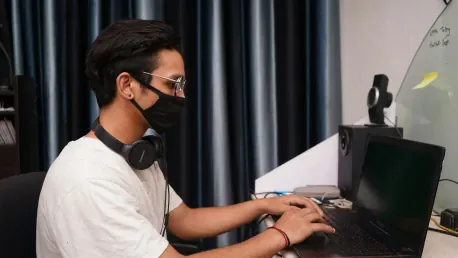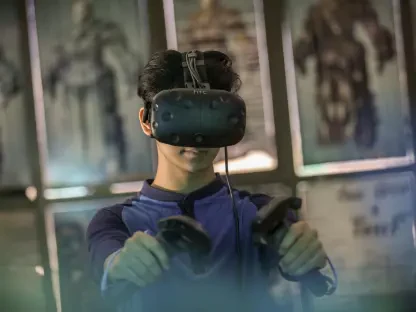In the rapidly evolving landscape of technology, the integration of artificial intelligence (AI) in various sectors has increasingly shown promise in solving pressing issues. One prominent example of this is highlighted by the recent endeavors of high school students who participated in the 10th annual student forum hosted by World Wide Technology (WWT) in St. Louis. This event brought together young minds from different schools to utilize AI solutions to counter cybersecurity challenges within educational institutions. Among numerous impressive projects, Pattonville High School emerged as a standout participant, winning the top prize for their ingenious application dedicated to enhancing cybersecurity.
Pattonville’s Innovative Approach
Development of “Ducky”
Pattonville High School’s victory was secured by their creation of an AI-powered application named “Ducky.” This browser extension is specifically designed to tackle some of the most common cybersecurity threats faced by students and educational staff alike. Ducky’s primary functions include detecting phishing emails, verifying the accuracy of social media content, and offering an AI chatbot to boost cybersecurity literacy. By addressing these crucial areas, the application not only helps in safeguarding digital information but also educates users on how to recognize and respond to potential cyber threats.
The effectiveness of Ducky lies in its multi-faceted approach to combating several forms of online deception. Phishing emails, which often trick users into providing sensitive information, are identified and flagged by the extension to prevent data breaches. Additionally, Ducky’s verification feature plays a significant role in curbing the spread of misinformation on social media platforms, an increasingly concerning issue for students who rely heavily on these platforms for news and communication. The AI chatbot further enriches the user experience by providing readily accessible information and guidance on best practices in cybersecurity, thereby fostering a more informed user base.
Teamwork and Technological Know-How
The success of Pattonville High School’s project underscores the importance of teamwork and adaptive learning in the field of AI and cybersecurity. Stephanie Carson, the computer science teacher leading the students, attributes their achievement to the collaborative spirit and relentless pursuit of knowledge shared within the team. Given the rapid technological advancements, Carson highlights the growing complexity of teaching AI concepts effectively. She relies on comprehensive resources such as YouTube tutorials and industry networking to bridge the knowledge gap and stay updated with current developments.
Students’ ability to work cohesively as a unit and leverage individual strengths was paramount in refining the Ducky application. This experience also emphasized the necessity of continuous learning and adaptability, key traits for anyone aspiring to succeed in the dynamic world of AI and cybersecurity. The students’ engagement in practical problem-solving exercises through the development of Ducky equips them with invaluable skills that extend beyond theoretical knowledge, preparing them for future challenges in their careers.
Expanding Inclusivity and Diversity in AI
Broadening Participation
The student forum, hosted annually by World Wide Technology, has seen a significant shift in focus toward promoting diversity and inclusion in the AI industry over the past four years. This change aligns with the growing recognition of the need to cultivate diverse talent to meet the future demands of the workforce. Matt Hernando from WWT emphasized the importance of this transition, noting that inclusive environments foster innovative solutions and comprehensive perspectives on complex issues.
This year’s forum topic encouraged students to think beyond their immediate environments and devise AI-driven solutions that benefit their schools and communities. An exemplary effort was demonstrated by Bayless High School, who received a $2,500 prize for their app specifically designed to aid non-English speaking immigrants. This application creates educational videos produced by AI in multiple languages, significantly enhancing access to educational resources for immigrant students who face language barriers. By addressing such niche but critical challenges, the forum underscores the importance of AI in bridging gaps and supporting underrepresented communities within the educational sector.
Future Workforce Preparation
The forum’s alignment with these inclusive objectives reflects World Wide Technology’s broader mission, guided by founder Dave Steward’s vision. As the industry anticipates a demographic shift in the coming years, WWT is dedicated to providing equal job opportunities and leveraging diverse talents in technology. Steward underscores the necessity of developing minority talent, ensuring that the future workforce is well-equipped to handle evolving technological demands. This focus on diversity helps cultivate an environment where innovative ideas can thrive, ultimately driving progress in the AI industry.
Students participating in the forum gained firsthand experience in contributing to meaningful technological solutions. By focusing on real-world applications, the project-based learning model utilized during the forum enabled students to hone their skills in AI and develop a conscientious approach to its use. This hands-on experience is instrumental in preparing students for their future careers, instilling a sense of responsibility and awareness of AI’s potential impact on society.
Responsible AI Usage and Future Considerations
Navigating Potential Risks
While the advancements showcased at the annual student forum are promising, there is also a pronounced awareness among students about the potential risks associated with AI misuse. The participants expressed cautious optimism regarding AI’s future implications in their professional paths. They acknowledged that, despite the significant benefits, AI poses risks that can lead to misuse and negative consequences. This balanced perspective is vital in fostering a culture of responsible AI usage, emphasizing the need for preventive measures and ethical considerations.
The forum served as a crucial introduction to the responsible use of AI, empowering students to think critically about the implications of their innovations. By encouraging students to devise solutions that not only address cybersecurity but also benefit their broader communities, the forum promotes a holistic understanding of technology’s potential impact. This approach helps inculcate values of ethical responsibility and long-term thinking among the young innovators.
Ongoing Education and Ethical Practices
In the swiftly advancing world of technology, the incorporation of artificial intelligence (AI) across various sectors has shown tremendous potential in addressing critical issues. A prime example of this is the recent participation of high school students in the 10th annual student forum organized by World Wide Technology (WWT) in St. Louis. This event gathered young minds from diverse schools to deploy AI solutions in tackling cybersecurity challenges faced by educational institutions. One particularly impressive project came from Pattonville High School, which won the top prize for their innovative application aimed at bolstering cybersecurity measures. The forum not only showcased the promising solutions developed by these students but also underscored the significant impact that young talent can have in the realm of technology. By leveraging AI, these students demonstrated a forward-thinking approach, offering insights that could benefit both their schools and the wider community.









